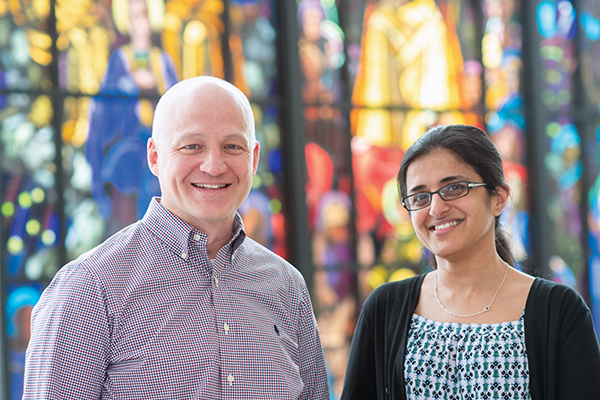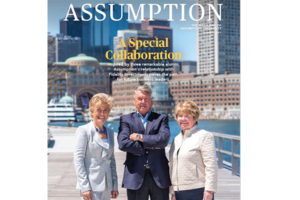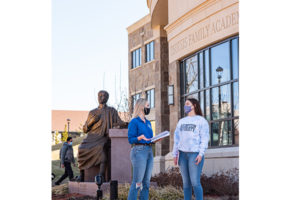
Climate change, hunger and food insecurity, and forced migration – the world’s complex problems require thinking that is broad and creative, from across academic disciplines. Practicing interdisciplinarity is easier said than done, however. Disciplinary training, teaching demands, and the surprisingly sticky issue of campus geography (where we sit!) tend to isolate faculty members from each other. Meanwhile, a truly interdisciplinary education goes beyond asking our students to take classes across disciplines; it requires that these classes and experiences be in conversation with one another. And the reality is that classes are more likely to be in conversation if faculty members truly are.
This desire for shared conversation is being expressed through a variety of initiatives at Assumption. For the last three years, faculty and staff members have come together for a service and reflection day at Noonday Farm in Winchendon. Noonday donates its organically farmed produce to local food banks and is supported solely by volunteer groups. The trip gives faculty and staff precious time and space to serve together, enjoy each other’s company, and reflect over lunch about our shared vocations at Assumption. We know from personal experience that friendships established at events like these not only make Assumption a more collegial place, but also produce new and creative collaborations in research and teaching that improve the education our students receive.
A great example is our Global Campus partnership with Catholic Relief Services (CRS), the world’s largest humanitarian organization. Through collaboration with Catholic institutions like Assumption, CRS seeks to educate and inspire students to better understand and help solve complex global problems. Our partnership with CRS, which we coordinate through an interdisciplinary advisory board, has led to a number of new co-curricular events on campus, including films, student-led refugee walks, and the Hounds4CRS basketball games. Recently, our CRS alliance has been brought into a larger interdisciplinary collaborative project, the new Center for Global Studies, which coordinates the College’s internationally-focused programs. And from this work arose yet another innovation: a one-credit, service-oriented course called Global Humanitarian Relief that was offered to students for the first time during the spring semester.
The emergence of interdisciplinary centers and institutes on our campus brings faculty and staff together around shared themes. For example, the D’Amour Center for Teaching Excellence engages faculty in discussions about teaching through its course innovation academy, faculty learning communities, and “food for thought” presentations by faculty on pedagogical innovations. Professors from psychology and biology are working together through the new Center for Neuroscience to provide students a variety of academic and co-curricular programming focused on this exciting field. Finally, the forthcoming Center for Purpose and Vocation expands upon our highly successful SOPHIA program to promote conversations about mission and vocation amongst our students, as well as our staff and faculty. After all, hospitable spaces for students to discern purpose and meaning must be nurtured by faculty and staff who already feel at home.
Inclusive, interdisciplinary conversations will continue to deepen our sense of common vocation and foster the future programs, projects, and intellectual insights our students are looking for.


